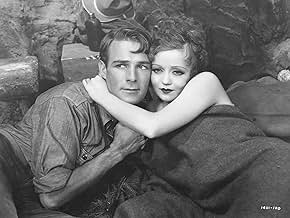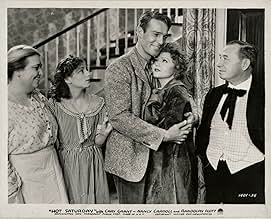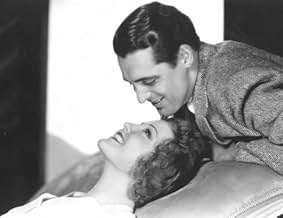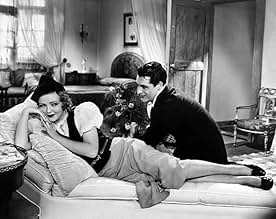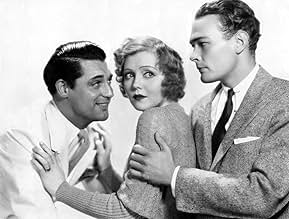IMDb RATING
6.5/10
1.4K
YOUR RATING
A pretty but virtuous small-town bank clerk is the victim of a vicious rumor from an unsuccessful suitor that she spent the night with a notorious womanizer.A pretty but virtuous small-town bank clerk is the victim of a vicious rumor from an unsuccessful suitor that she spent the night with a notorious womanizer.A pretty but virtuous small-town bank clerk is the victim of a vicious rumor from an unsuccessful suitor that she spent the night with a notorious womanizer.
Lilian Bond
- Eva Randolph
- (as Lillian Bond)
Nora Cecil
- Gossip on Telephone
- (uncredited)
Billy Engle
- Third Bank Customer
- (uncredited)
Kenner G. Kemp
- Party Guest
- (uncredited)
Marjorie Main
- Gossip in Window
- (uncredited)
Dave O'Brien
- Party Guest
- (uncredited)
Storyline
Did you know
- TriviaThis was Cary Grant's first role as a leading man.
- GoofsWhen Conny Billop signs his name in Ruth's date planner, he spells it "Connie", but in the credits the character's name is listed as Conny.
- Quotes
Ruth Brock: Is Listerine good for brains?
Romer Sheffield: Love they tell me is better.
- Crazy credits(Opening titles) Marysville boasted of one bank, two fire engines, four street cars, and a busy telephone exchange. Everyone knew on Sunday what everyone else did on Saturday... and the rest of the week.
- ConnectionsFeatured in Hollywood: The Gift of Laughter (1982)
- SoundtracksIsn't It Romantic?
(uncredited)
Written by Richard Rodgers and Lorenz Hart
Heard on soundtrack when Carroll arrives at Grant's house.
Featured review
Hot Saturday (1932)
There are a few early Cary Grant movies where he has a small role, or where he isn't quite the "Cary Grant" we have come to expect (and which he always jokingly said he wanted to become himself). But this one is pure, true Grant, and very early, indeed. But even better, the plot, the mise-en-scene (including town scenes, domestic situations, and a range of outdoor stuff at the lake including a bohemian roadhouse on the water), and the photography are amazing. I mean amazing. There are a few stumbles in the acting, but you get so swept along, and so continually surprised, this won't matter much at all.
The director of all this gets a huge amount of credit, because William Seiter who pulls the best out of the cast and the crew, equally--and who presumably helped choose some terrific location shots as well as matching studio scenes. Seiter was a Hollywood working man director, doing lesser A-list films and making them decent, though none that I've seen (a small fraction of a huge output from the 20s to the 40s) has the energy and flair of this one. And this is an unsung one, definitely worth seeking out.
Likewise, Arthur Todd behind the camera did a dumpload of good if unamazing films, and so it was with the music and set design. But the leading lady is another story. Nancy Carroll really steals the show, even from Grant and the other leading male, the rather wooden and handsome Randolph Scott. She has a kind of live-wire, doll-face quality a little similar to Claudette Colbert, easily as amazing in this film. Carroll supposedly had more fan mail than any actress in this era of Hollywood, and was contracted with Paramount (which was the studio here). But she was so difficult to work with offscreen (rejecting many parts) they let her go, and her career slid, and she probably missed out on another higher kind of stardom.
But here she is alive, sympathetic, and complex on screen. If Cary Grant isn't enough to lure you in, give Carroll her due.
This is of course a pre-code film (widely advertised as such) and in fact the looseness of the events, the morality of the lead, and the suggestive scenes (never explicit) all help make this come alive. The dance and party scenes are so much fun you'll wish you were there, and the cave in the storm as well as the night scenes in the woods are pretty amazing, too. The end will prove, again, both the ability of pre-code films to touch on real life issues, and the need of even these kinds of films to have a moral compass by the end. The very last few seconds takes care of this.
Great stuff. A huge surprise for me.
There are a few early Cary Grant movies where he has a small role, or where he isn't quite the "Cary Grant" we have come to expect (and which he always jokingly said he wanted to become himself). But this one is pure, true Grant, and very early, indeed. But even better, the plot, the mise-en-scene (including town scenes, domestic situations, and a range of outdoor stuff at the lake including a bohemian roadhouse on the water), and the photography are amazing. I mean amazing. There are a few stumbles in the acting, but you get so swept along, and so continually surprised, this won't matter much at all.
The director of all this gets a huge amount of credit, because William Seiter who pulls the best out of the cast and the crew, equally--and who presumably helped choose some terrific location shots as well as matching studio scenes. Seiter was a Hollywood working man director, doing lesser A-list films and making them decent, though none that I've seen (a small fraction of a huge output from the 20s to the 40s) has the energy and flair of this one. And this is an unsung one, definitely worth seeking out.
Likewise, Arthur Todd behind the camera did a dumpload of good if unamazing films, and so it was with the music and set design. But the leading lady is another story. Nancy Carroll really steals the show, even from Grant and the other leading male, the rather wooden and handsome Randolph Scott. She has a kind of live-wire, doll-face quality a little similar to Claudette Colbert, easily as amazing in this film. Carroll supposedly had more fan mail than any actress in this era of Hollywood, and was contracted with Paramount (which was the studio here). But she was so difficult to work with offscreen (rejecting many parts) they let her go, and her career slid, and she probably missed out on another higher kind of stardom.
But here she is alive, sympathetic, and complex on screen. If Cary Grant isn't enough to lure you in, give Carroll her due.
This is of course a pre-code film (widely advertised as such) and in fact the looseness of the events, the morality of the lead, and the suggestive scenes (never explicit) all help make this come alive. The dance and party scenes are so much fun you'll wish you were there, and the cave in the storm as well as the night scenes in the woods are pretty amazing, too. The end will prove, again, both the ability of pre-code films to touch on real life issues, and the need of even these kinds of films to have a moral compass by the end. The very last few seconds takes care of this.
Great stuff. A huge surprise for me.
- secondtake
- Sep 23, 2011
- Permalink
- How long is Hot Saturday?Powered by Alexa
Details
- Runtime1 hour 13 minutes
- Color
- Aspect ratio
- 1.37 : 1
Contribute to this page
Suggest an edit or add missing content


